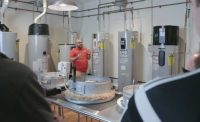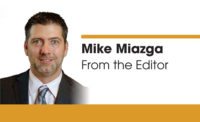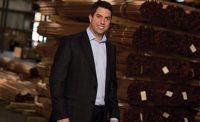Todd Adams, president of Lakeland, Florida-based sanitary-grade stainless steel tube, valves and fittings manufacturer Sanitube, had plenty of reasons to smile back in July 2017.
Adams, whose company mainly does business in the food and beverage space, was contacted back then by a customer in the dairy production industry in need of specific and unusual-sized sanitary tubing.
“We didn’t manufacturer it here and to the best of our knowledge we knew of nobody else in the U.S. that could manufacture to those dimensions and specs,” Adams says. “What they were looking for was unique.”
Adams told the customer about Sanitube’s extensive relationships with mills overseas and if they were interested, his team could check out the possibility of it being manufactured in China.
“It took some time and several conference calls with mills, but we found a mill that could produce it,” he says. “This ended up being the largest order we’ve ever received in the company’s eight-year-old history. It was for several million dollars in specialty tubing.”
Contracts were signed, orders placed and a deposit taken. All seemed like it was going smoothly as the first two containers entered the U.S. in California to no fanfare.
Containers 3 through 10, well that was a different story. Enter the Section 232 tariffs. “Those containers were in transit on the Pacific Ocean when the 232 tariffs were announced,” Adams laments.
And they still were in transit when the tariffs were implemented 15 days later.
Adams ended up paying the tariffs for the eight containers that just a month earlier equaled a high point in the company’s brief history. Adams calls it “a banner order for us.”
“We had no other option,” he says. “We couldn’t turn the boat around. We had purchased the material. I was left holding the bag on 25% duties. That was demanded of us immediately when the material arrived in California. We were left holding a bill for several hundred-thousand dollars for duties we hadn’t planned for. It put us in a very difficult situation.”
Adams notes Sanitube is fortunate that the customer agreed to contribute to the tariff bill. Adams was able to cover the balance with his company’s cash reserves and his own personal savings. “We did it with the understanding there are exemptions available for companies bringing in product that otherwise is not produced in the United States,” he says. “That particular product still is not produced here.”
Adams went through the exemption process only to be buried in paperwork technicalities. “We had an unpleasant experience going through the process,” he says. “It kept getting kicked back to us for minor omissions not related to the merits of the application, such as the iron content of stainless steel. Each time, the Department of Commerce would not allow us to simply add this information. We were required to completely restart the application process.”
Adams found out that once an application is granted, it only would be retroactive to the acceptance date, not the application date. All the tariff-eligible containers had arrived in the U.S. since his original application date, and the application acceptance delays had essentially disqualified his company from receiving a refund, even if his application was to eventually be granted.
But instead of standing still, Adams reached out to his elected officials. He ended up being referred to U.S. Rep. Jackie Walorski (R-Ind.) who has been vocal about the tariffs issue. “Her district has been severely impacted by the tariffs because it contains the largest manufacturer of pontoon boats, so they are using a ton of aluminum. And they are huge producers of RVs in that area,” Adams notes.
Adams was invited to Capitol Hill and told his story to the House Ways and Means Committee. Adams reports since his trip to Washington a change to the tariff-exemption process has been made to where it is now retroactive to the original application date.
“That timing means everything,” says Adams, who notes he is going to reapply for exemption based on his original application date. “We kept getting kicked back for two months while all the material we brought back from China kept coming into port. That rule will directly and positively impact companies. That little gesture of reaching out to the business community and listening to concerns made a huge difference. We were able to make the process a little better. They need to continue to confer with industry to continue to make these processes better.”





